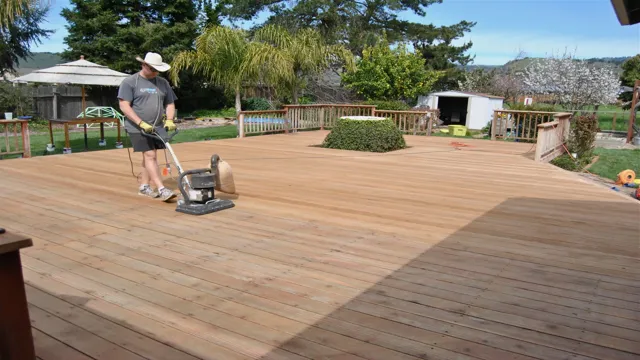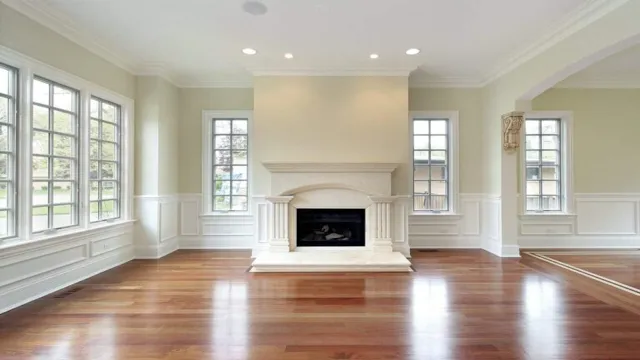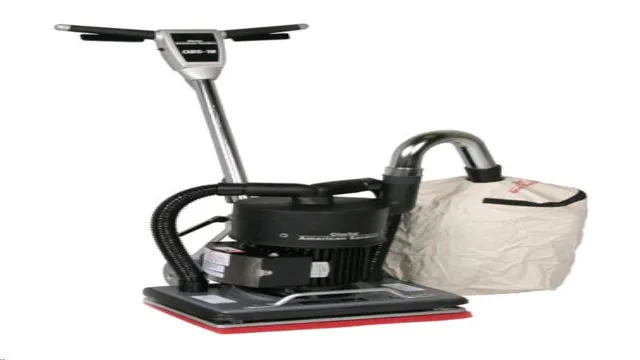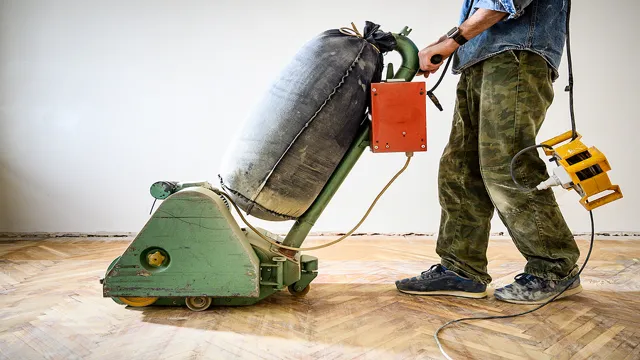How Much Does It Cost to Rent a Floor Sander? Expert Guide & Tips
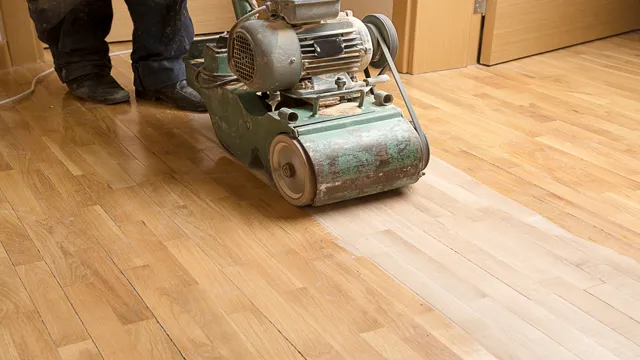
Do you have a home renovation project in mind, but don’t want to shell out thousands of dollars for hired professionals? Renting a floor sander could be your solution. Sanding your floors can improve the look and quality of your home, but it can also be expensive if you don’t know where to start. That’s where we come in.
In this blog, we’ll break down the cost of renting a floor sander, so you can plan your project with ease. Whether you’re a DIY enthusiast or just looking for ways to save money, stick with us to learn everything you need to know about floor sander rentals.
Overview
If you’re considering tackling a DIY flooring project, you’re likely wondering about the cost of renting a floor sander. The cost to rent a floor sander can vary, depending on the rental period and the specific type of floor sander needed. On average, a floor sander can cost anywhere from $50 to $100 per day to rent.
Some rental companies may offer weekly rates, which could save you money if you need the floor sander for an extended period of time. In addition to the cost of the floor sander rental, you’ll also need to purchase sandpaper and may need to rent additional equipment, such as a vacuum for dust collection. However, renting a floor sander can be a cost-effective option compared to hiring a professional to do the job for you.
With some careful planning and preparation, you can achieve professional-looking results without breaking the bank.
What is a floor sander?
A floor sander is a tool used to smooth and level out the surface of a wooden floor. It is an essential tool for anyone wanting to improve the look and feel of their wooden floors. A typical floor sander consists of a motor that powers a drum and sandpaper.
The sander is operated by holding it in both hands and moving it over the floor in a back-and-forth motion. This motion helps to evenly distribute pressure and avoid uneven spots on the floor. As the sandpaper spins, it removes any rough spots or blemishes from the floor surface.
The result is a smooth, even finish that makes the floor look brand new. Using a floor sander is an easy and affordable way to improve the look of your home, as it can remove years of wear and tear from wooden floors. If you’re considering renovating your floors, a floor sander can be a valuable tool that saves you time and money.
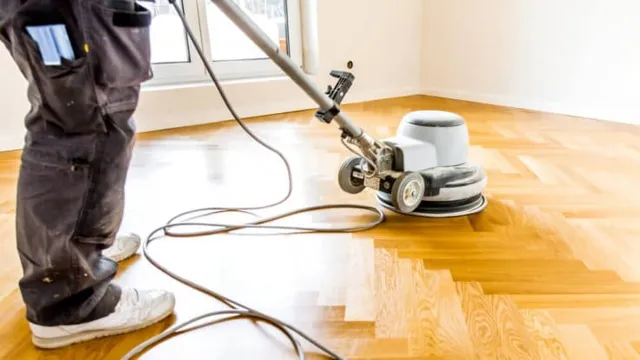
Why rent a floor sander?
Renting a floor sander can be a great choice for anyone looking to refinish their hardwood floors or remove old paint or stain. Not only will it save you money compared to hiring a professional to do the job, but it also gives you more control over the process and allows for greater customization of the final result. Additionally, renting a floor sander can save you time in the long run as it is a more efficient method than trying to sand by hand.
The key to successful floor sanding is using the correct techniques and tools, and renting a floor sander ensures that you have access to the best equipment available. So why not give it a try and take your floors to the next level?
Factors that Affect Rental Cost
If you’re wondering how much it costs to rent a floor sander, several factors come into play, which can influence the overall rental cost. One of the most significant factors is the type of floor sander you need. Different types of floor sanders come with varying rental prices.
For instance, a drum sander typically costs more to rent than an orbital sander due to its larger size and power. Another factor that can affect rental cost is the duration of the rental period. If you rent a floor sander for a longer period, the rental cost per day may decrease.
Additionally, the location of the rental store can also play a role in the rental cost. Depending on where you are located, rental stores may have higher or lower rates. Finally, the condition of the rented equipment can also impact the rental cost.
Newer equipment will most likely cost more to rent than older equipment due to its better functionality and condition. So, when considering the rental cost of a floor sander, it’s necessary to look at these factors to determine the most suitable rental option for your needs and budget.
Type of floor sander
When it comes to renting a floor sander, there are a variety of factors that can affect the cost. Perhaps the most important factor is the type of floor sander you need. Different types of sanders are better suited for different types of floors, and each type will come with a different rental cost.
For example, a drum sander is best for sanding large, flat hardwood floors, while an orbital sander may be better suited for a wood deck or intricate hardwood patterns. Other factors that can influence the cost of renting a floor sander include the rental period, the size of the sander, and any additional costs such as delivery or pickup fees. If you’re on a budget, it’s important to shop around and compare rental fees from different suppliers to find a deal that fits your needs.
Ultimately, the type of floor sander you choose will play a major role in the rental cost, so it’s worth doing your research and choosing the right sander for your project.
Rental duration
When it comes to renting equipment, the duration of the rental can greatly impact the overall cost. Generally, the longer the rental period, the lower the cost per day. For example, renting a piece of equipment for a day may cost $100, but renting it for a week may only cost $500, making the daily cost just $7
4 This is because rental companies want to incentivize longer rental periods and ensure that their equipment is being fully utilized. However, it’s important to keep in mind that different rental companies may have varying policies and agreements regarding rental duration and pricing, so always be sure to read the fine print.
Additionally, it’s worth considering whether you will actually need the equipment for the entire rental period, as returning it early or extending the rental period can also impact the final cost. Keyword: rental duration.
Location
Location Location is one of the key factors that affect rental cost. Generally, the rental cost in urban areas is much higher than that in suburban and rural areas. This is because urban areas are more densely populated and offer more job opportunities, social amenities, and services than suburban and rural areas.
For example, rental costs in the central business district of a city are usually higher than those in the outlying areas due to the proximity to more job opportunities and amenities such as restaurants, major shopping centers, and public transportation. Additionally, the rental cost may also vary depending on the accessibility of the location. A property located near a major highway, airport, or public transportation hub will likely cost more than one located in a remote area because it provides better access to services and amenities.
Other factors such as the crime rate, quality of schools, and cost of living in a given location may also influence the rental price. Ultimately, when looking for a rental property, consider your budget and the convenience and accessibility of the location to determine the best value.
Average Rental Costs
If you’re thinking about refinishing your floors, then you’ll likely need to rent a floor sander. The cost of renting a floor sander can vary depending on where you live and the size of the machine you need, but the average cost falls between $50 and $150 per day. This price includes the sander itself as well as the necessary attachments, but keep in mind that you’ll also need to buy sandpaper and possibly other supplies.
Some rental places offer multi-day discounts, so it’s worth asking if you expect to need the sander for longer than a day. Overall, renting a floor sander can be an affordable way to get the job done, especially compared to hiring a professional. So if you’re up for the challenge of doing it yourself, it’s definitely worth considering renting a floor sander.
Drum floor sander: $50 to $75 per day
When it comes to refinishing hardwood floors, renting a drum floor sander is essential. On average, you can expect to pay between $50 and $75 per day to rent this powerful tool. A drum floor sander is the perfect tool to remove old finishes, stains, and scratches from hardwood flooring.
It’s known for its incredible sanding power, which makes quick work of any refinishing job. While renting a drum floor sander may seem expensive, it’s a fraction of the cost of having professionals refinish your floors, and it allows you to control the process entirely. Plus, the results are equally stunning if you take the time to do it right.
So, if you want to tackle a floor refinishing project on your own, renting a drum floor sander is an investment worth making. Trust us; you won’t be disappointed with the results!
Orbital floor sander: $50 to $75 per day
If you’re planning a DIY home renovation project and need to rent tools, it’s helpful to know the average rental costs. One tool you may need is an orbital floor sander, which can cost between $50 to $75 per day to rent. This tool is ideal for sanding hardwood floors and removing old, worn-out finishes.
Its circular motion allows for more even sanding and reduces the risk of leaving marks on the flooring. Renting an orbital floor sander can save you multiple trips to the hardware store, but be sure to read the instructions carefully and take safety precautions, as these machines can be quite powerful. With a little patience and a steady hand, you can transform your floors into a beautiful new space.
Edger sander: $25 to $50 per day
When it comes to renting equipment, it’s essential to know what to expect in terms of cost. For an edger sander, you can expect to pay anywhere from $25 to $50 per day, depending on where you rent it from. Keep in mind that these costs can vary, and there may be additional fees for delivery, pickup, or damage.
However, renting an edger sander can be well worth the investment if you have a lot of sanding to do, or if you only need it for a one-time project. Plus, you won’t have to worry about the cost and maintenance of owning your own edger sander. All in all, renting an edger sander can save you time and money, while still providing you with the high-quality results you need for your sanding projects.
Additional Costs
When renting a floor sander, there are additional costs that you need to consider aside from the rental fee. For instance, you may need to purchase sandpaper as the rental service may not provide one or it may not be included in the rental price. The cost of sandpaper varies depending on the grit and size that you need for your project.
You also need to consider the cost of renting a debris bag to collect dust and wood particles during the sanding process. If you plan on renting a floor edger, the cost will be an additional expense. Furthermore, if you don’t have a vehicle to transport the equipment, you may need to rent a truck or hire a delivery service which can add to the overall cost.
All these extra costs can add up quickly so make sure to factor them in when budgeting for your flooring project.
Delivery and pick-up fees
Delivery and pick-up fees can sometimes come as an unexpected additional cost when ordering items online. While some retailers offer free delivery, others may charge a fee based on the distance or weight of the package. It’s important to be aware of these fees before making your purchase, as they can quickly add up and significantly increase the overall cost.
Additionally, some retailers may charge a fee for pick-up options, especially if the order is not picked up within a certain timeframe. It’s always a good idea to carefully review the terms and conditions of any online purchase to fully understand any potential additional costs that may apply. By doing so, you can avoid any surprises and make informed purchasing decisions that fit your budget.
Overall, delivery and pick-up fees are just one of the many factors to consider when shopping online.
Refurbishing fee
When it comes to purchasing refurbished items, it’s important to keep in mind that there may be additional costs. One of these costs is the refurbishing fee, which is typically included in the price of the item. This fee covers the cost of inspecting, cleaning, and repairing the item to ensure that it works like new.
Refurbishing fees can vary depending on the type of item and the extent of repairs needed. However, it’s important to keep in mind that these fees are often much lower than the cost of buying a brand new item. By opting for a refurbished item, you can save money while still getting a product that works just as well as a new one.
So, if you’re in the market for a new item, consider looking into refurbished options and remember to factor in any additional costs such as the refurbishing fee.
Tips for Saving Money
If you’re looking to give your floors a fresh new look, renting a floor sander can be an excellent option. But, how much does it cost to rent a floor sander? Well, the cost can range anywhere from $50 to $300 per day, depending on the type and size of the sander. Additionally, you may need to pay a deposit, which is refundable upon returning the sander in good condition.
To save money on floor sanding, it’s a good idea to do your research and compare prices from different rental companies. You may also want to consider renting the sander for a longer period, as many companies offer discounts for extended rentals. Keeping these tips in mind can help you save money on your floor sanding project and still achieve the look you desire.
Conclusion
In the end, the cost of renting a floor sander will depend on a variety of factors including location, rental duration, and type of sander needed. But one thing is for sure, getting your hands on a floor sander can be a game-changer for any DIY flooring project. Just remember, before starting to work on your floors, make sure to sand out your doubts and leave a smooth finish that will leave your guests floored!”
FAQs
What is the average cost to rent a floor sander for a day?
The average cost to rent a floor sander for a day ranges from $50 to $100, depending on the type of sander and the rental location.
What type of floor sander is best for my hardwood floors?
For hardwood floors, it is recommended to use a drum sander or an orbital sander. Drum sanders are more aggressive and can remove deep scratches, while orbital sanders are gentler and are ideal for smoothing the surface.
How long does it take to sand a room with a floor sander?
The time it takes to sand a room with a floor sander depends on the size of the room and the type of sander used. On average, it takes about 4-6 hours to sand a 200 sq. ft. room with a drum or orbital sander.
Can I rent a floor sander for a weekend or a week?
Yes, most rental companies offer floor sanders for rent on a daily, weekend, or weekly basis. The longer the rental period, the lower the daily rental cost.
Do I need to wear any protective gear when using a floor sander?
Yes, it is recommended to wear a dust mask, safety glasses, and ear protection when using a floor sander. You should also wear long pants and closed-toe shoes to protect your feet from flying debris.
What kind of maintenance is required for a floor sander?
Basic maintenance for a floor sander includes cleaning the dust bag or canister and inspecting the sandpaper for wear and tear. You should also check the sander’s electrical cords for damage before each use.
Can I sand a painted or stained floor with a floor sander?
Yes, a floor sander can be used to remove paint or stain from a floor. However, you may need to use a more aggressive sandpaper grit and make multiple passes to remove all of the paint or stain.

